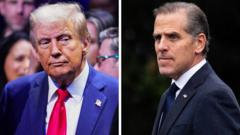Donald Trump and Joe Biden have surprisingly found common ground in their approach to high-profile legal prosecutions, both claiming political motivations behind legal actions against themselves or their family members.
Recently, Joe Biden pardoned his son Hunter Biden, condemning what he called an unfair prosecution. “No reasonable person who looks at the facts of Hunter’s cases can reach any other conclusion than Hunter was singled out only because he is my son,” Biden stated. This rhetoric closely mirrors Trump’s frequent claims of politically motivated prosecutions, such as in his New York hush-money case.
The cases involving Hunter Biden and Trump share several notable similarities. Both were brought to court in 2024 for incidents that occurred years earlier – Trump’s payments to Stormy Daniels in 2016 and Hunter Biden’s gun application and tax issues from 2016 to 2018. Both cases also experienced unexpected legal twists, with investigations that seemed unlikely to proceed ultimately moving forward.
The prosecutions involved unusual applications of existing laws. The campaign finance violations in Trump’s case were federal crimes previously declined by US attorneys. Hunter Biden’s gun application case was rare, and his tax violations were typically resolved through back-payments and fines rather than criminal charges.
Despite similarities, key differences exist. Hunter Biden never held public office, and Trump faced multiple prosecutions for more serious alleged crimes. Both sides of the political spectrum interpreted these cases differently, with Democrats and Republicans viewing the prosecutions through partisan lenses.
Legal experts like Kevin McMunigal suggest that the perception of politically motivated prosecutions is largely inaccurate. He explains that legislators frequently pass criminal statutes that are rarely prosecuted, creating a complex legal landscape that the public may not fully understand.
The broader context reveals a growing distrust in American political institutions. John Geer, a political science professor, notes that “Justice has never been blind” and these cases reflect a wider crisis of faith in government.
Trump has capitalized on this institutional distrust, promising sweeping reforms and railing against the government “swamp.” Biden’s recent adoption of similar rhetoric about selective prosecution might paradoxically undermine the institutions he has long served.
Ultimately, both Hunter Biden and Trump seem likely to avoid significant legal consequences. Hunter Biden has been pardoned, while Trump’s potential presidential return might shield him from prosecution.
These legal developments highlight a critical moment in American democracy, where public perception of justice is increasingly colored by political allegiances. The cases of Hunter Biden and Donald Trump demonstrate how legal proceedings can be weaponized as political narratives, potentially eroding public trust in the judicial system.
The situation reflects a broader trend of political polarization, where legal processes are increasingly viewed through a partisan lens rather than as neutral mechanisms of justice.




